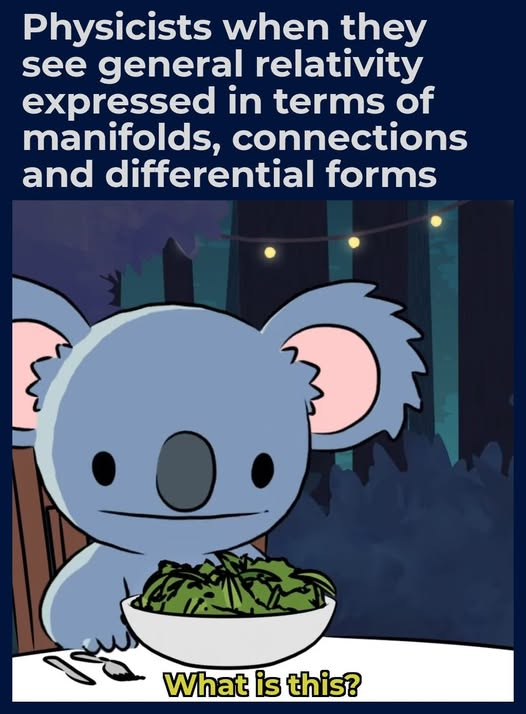this post was submitted on 16 Feb 2025
290 points (99.0% liked)
Science Memes
12359 readers
2109 users here now
Welcome to c/science_memes @ Mander.xyz!
A place for majestic STEMLORD peacocking, as well as memes about the realities of working in a lab.

Rules
- Don't throw mud. Behave like an intellectual and remember the human.
- Keep it rooted (on topic).
- No spam.
- Infographics welcome, get schooled.
This is a science community. We use the Dawkins definition of meme.
Research Committee
Other Mander Communities
Science and Research
Biology and Life Sciences
- [email protected]
- [email protected]
- [email protected]
- [email protected]
- [email protected]
- [email protected]
- [email protected]
- [email protected]
- [email protected]
- [email protected]
- [email protected]
- [email protected]
- [email protected]
- [email protected]
- [email protected]
- [email protected]
- [email protected]
- [email protected]
- [email protected]
- [email protected]
- [email protected]
- [email protected]
- [email protected]
- [email protected]
- !reptiles and [email protected]
Physical Sciences
- [email protected]
- [email protected]
- [email protected]
- [email protected]
- [email protected]
- [email protected]
- [email protected]
- [email protected]
- [email protected]
Humanities and Social Sciences
Practical and Applied Sciences
- !exercise-and [email protected]
- [email protected]
- !self [email protected]
- [email protected]
- [email protected]
- [email protected]
Memes
Miscellaneous
founded 2 years ago
MODERATORS
you are viewing a single comment's thread
view the rest of the comments
view the rest of the comments

Can someone explain this to my physics grad student ass please?
Manifolds and differential forms are foundational concepts of differential topology, and connections are a foundational concept of differential geometry. They are mathematical building blocks used in modern physics, essentially enabling the transfer of multivariable calculus to arbitrary curved surfaces (without relying on an explicit embedding into Euclidean space). I think the joke is that physics students don't typically learn the details of these building blocks, rather just the relevant results, and get confused when they're emphasized.
For a tl;dr about the concepts mentioned:
A manifold is a curve, surface, or higher-dimensional object which locally resembles Euclidean space around each point (e.g. the surface of a sphere is a 2D manifold; tiny person standing on a big sphere perceives the area around them to resemble a flat 2D plane).
Differential forms are "things that can be integrated over a manifold of the corresponding dimension." In ordinary calculus of 1 variable, that's a suitably regular function (e.g. a continuous function), and we view such a function f(x) as a differential form by writing it as "f(x) dx."
A connection is a way of translating local tangent vectors from one point on a manifold to another in a parallel manner, i.e. literally connecting the local geometries of different points on the manifold. The existence of a connection on a manifold enables one to reason consistently about geometric concepts on the whole manifold.
I do not recall well, but connections are sections of a suitable bundle, right? I have to eventually learn this but eh, seems too tedious. Do I need to take an entire class to really know it?
You might be thinking of a [connection of an affine bundle](https://en.wikipedia.org/wiki/Connection_(affine_bundle). You could learn it through classes (math grad programs usually have a sequence including general topology, differential topology/smooth manifolds, and differential geometry) or just read some books to get the parts you need to know.
You lost a bracket in your link